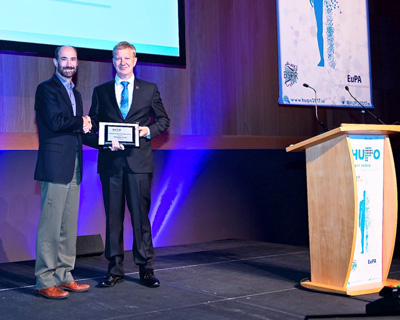Dr. Christopher Overall recently won one of the most prestigious annual awards of the Human Proteome Organization (HUPO): the Discovery in Proteomic Sciences Award was presented to him at the 16th HUPO World Congress, held in Dublin, Ireland, from September 17 to 21, 2017.
HUPO is an international scientific organization that represents and promotes proteomics, the large-scale study of proteins, particularly their structures and functions.
His award lecture, titled “Protein TAILS Tell Remarkable Tales,” was given at the general assembly of the meeting to 1321 delegates from over 30 countries.

Dr. Christopher Overall (R), with the president of HUPO, Dr. Michael Synder from Stanford University, receives the Discovery in Proteomic Sciences Award at the 16th HUPO World Congress., held in Dublin, Ireland, from September 17 to 21, 2017.
“Proteomics is the ‘human genome project of proteins,’” Overall says. “Proteins are what make all cells, tissues and organisms grow, have shape, form and function. The human proteome is the product of the human genome that gives us life and makes us human. By understanding and identifying all proteins expressed in humans much will be learned of how we grow, develop, maintain life and respond to disease and illness throughout our lives.”
Moreover, Overall points out that proteomics is enabling personalised medicine by identifying the actual components of human tissues and what happens to them when they go wrong. This knowledge, he says, is enabling rapid advances in medical diagnostics and is leading to new cures.
Overall, who is the Canada Research Chair in Protease Proteomics and Systems Biology and a professor in the Department of Oral Biological & Medical Sciences at UBC Dentistry, has pioneered a suite of proteomic techniques known as terminomics and degradomics. These techniques have been developed with his team of researchers at UBC and have led to multiple discoveries that have impacted the understanding of immunodeficiency diseases and inflammatory diseases such as periodontitis and arthritis reported in some of the highest impact scientific and dental journals today.
“By knowing the ends of proteins, known as termini, the function of many key proteins in the immune system and of growth factors is now known to switch between ‘on and off’ states,” Overall says. Without identifying these features, conclusions made from genomics alone can be completely opposite to what is really happening in the cell and tissues. These features of a protein also make for accurate biomarkers of disease to aid in diagnosis and monitoring of treatment. In addition, the use of terminomcs has opened a wealth of new doors of understanding many diseases and the body’s response in fighting illness.
Recently terminomics has been applied by the Overall Lab to the human dental pulp, the “nerve” of teeth, and odontoblast cells that form the inner layer of teeth known as dentin. This research is now in press in the Journal of Dental Research. Other research that is forthcoming includes new insights into the mechanism of chronic inflammatory diseases including the processes underlying periodontitis, rheumatoid diseases and lupus as well as rare immunodeficiency diseases.